Abstract
A standardised inventory of stressful life events and a bowel symptom questionnaire were administered at three month intervals for one year to 383 women who were unselected with respect to bowel symptoms. A NEO Personality Inventory was given initially to assess neuroticism. Subjects who satisfied restrictive diagnostic criteria for irritable bowel syndrome were compared with those who complained of abdominal pain plus altered bowel habits but who did not meet restrictive diagnostic criteria (functional bowel disorder) and with controls without bowel dysfunction. The irritable bowel group showed significantly higher levels of stress than the other two groups even when the confounding effects of neuroticism were statistically controlled for. Time lagged correlations showed that stress in one three month interval was significantly correlated with bowel symptoms in the subsequent three month interval for all groups. The slope of the regression line relating stress to bowel symptoms was significantly steeper for the irritable bowel group than for the other two groups at three and six months, suggesting that subjects with irritable bowel syndrome show a greater reactivity to stress. Stress scores were also significantly correlated with the number of disability days and the number of medical clinic visits for bowel symptoms.
Full text
PDF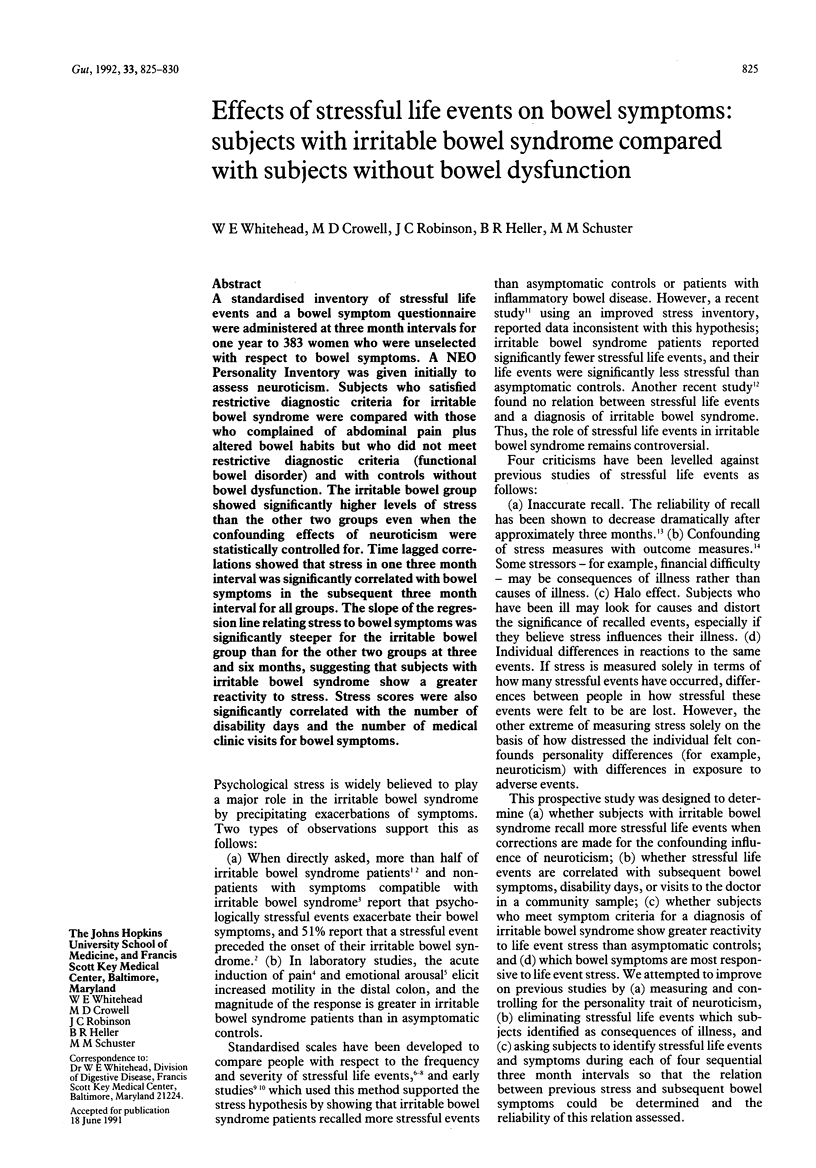
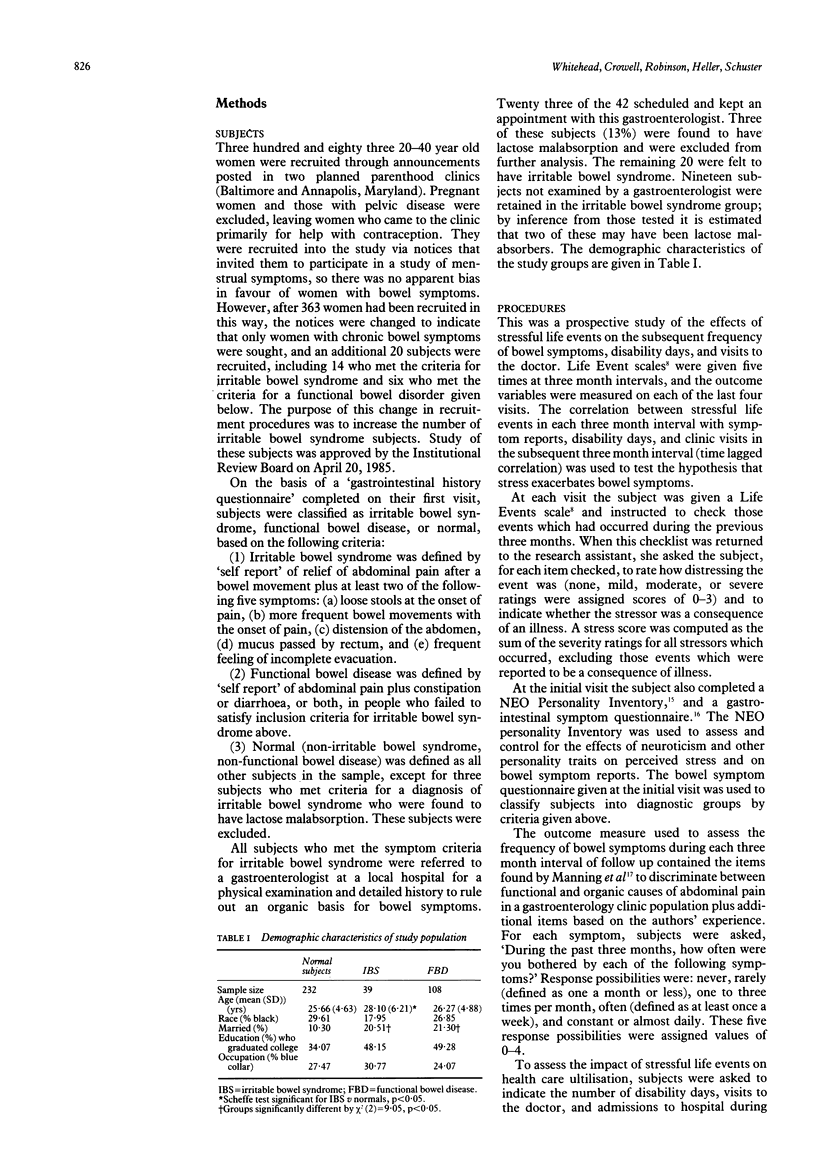
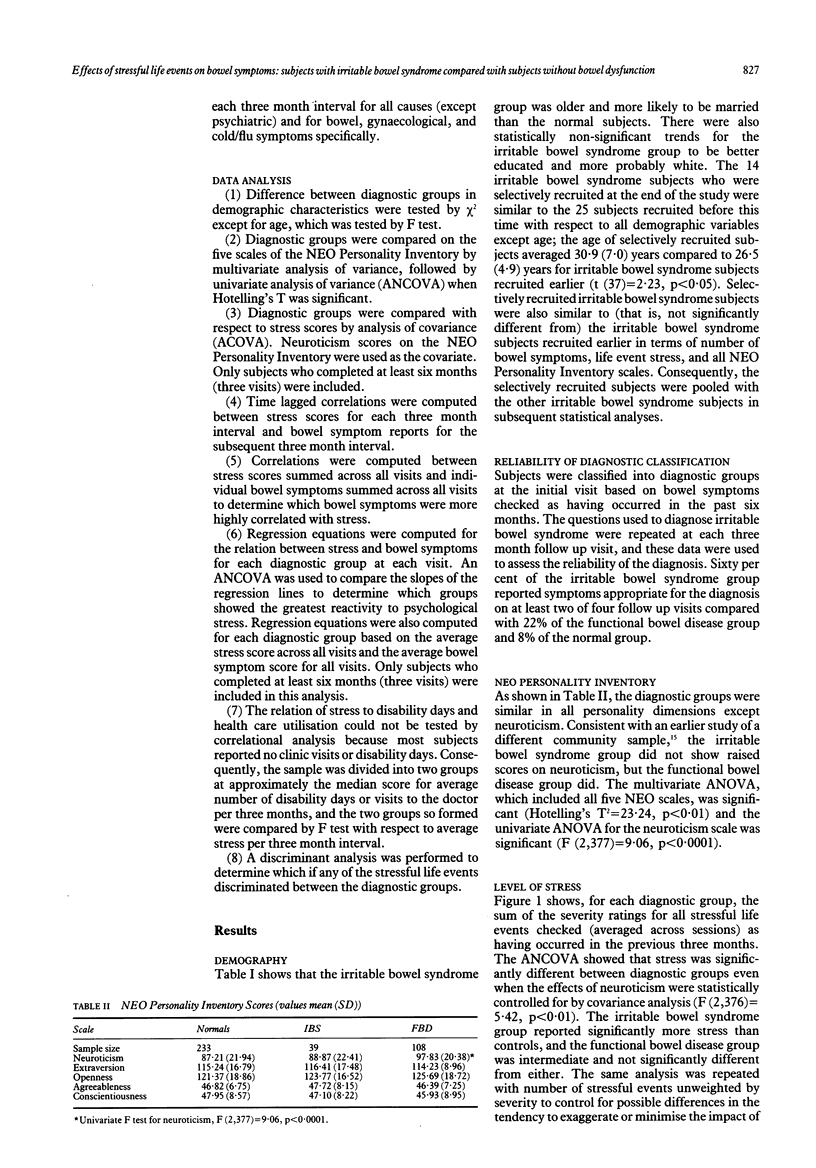
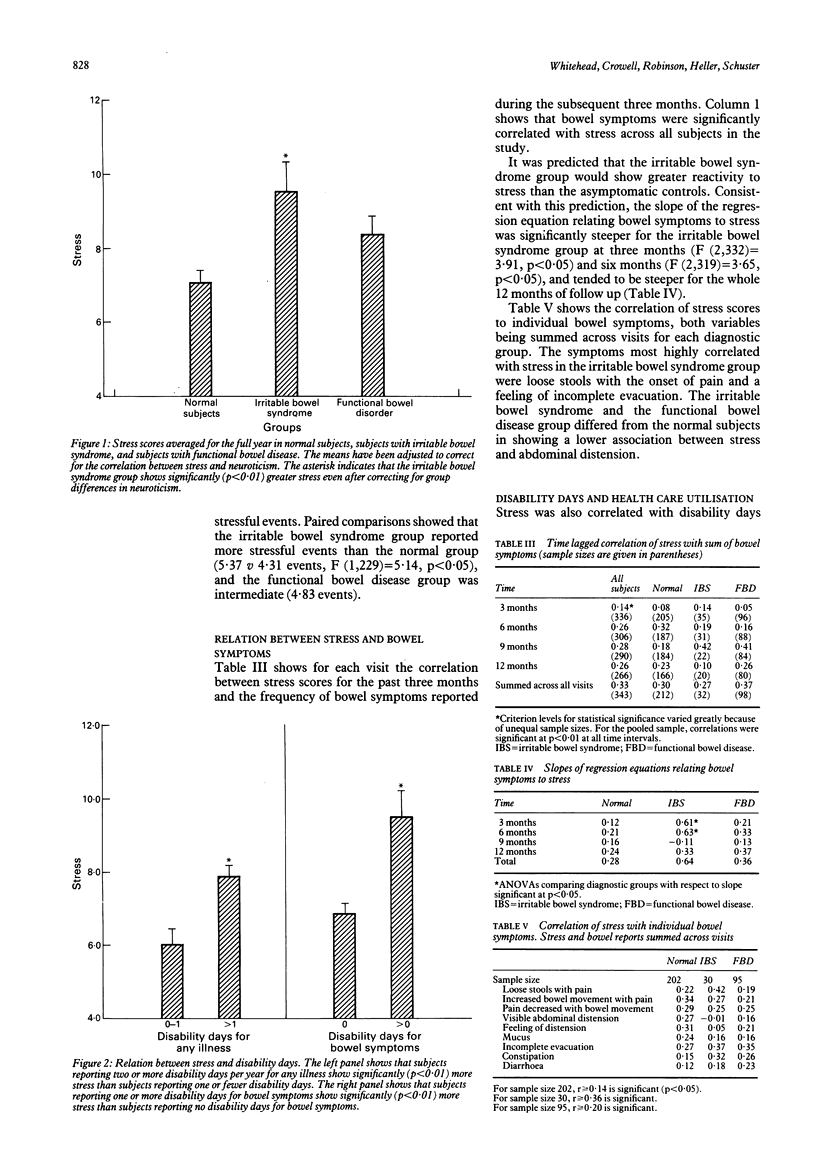
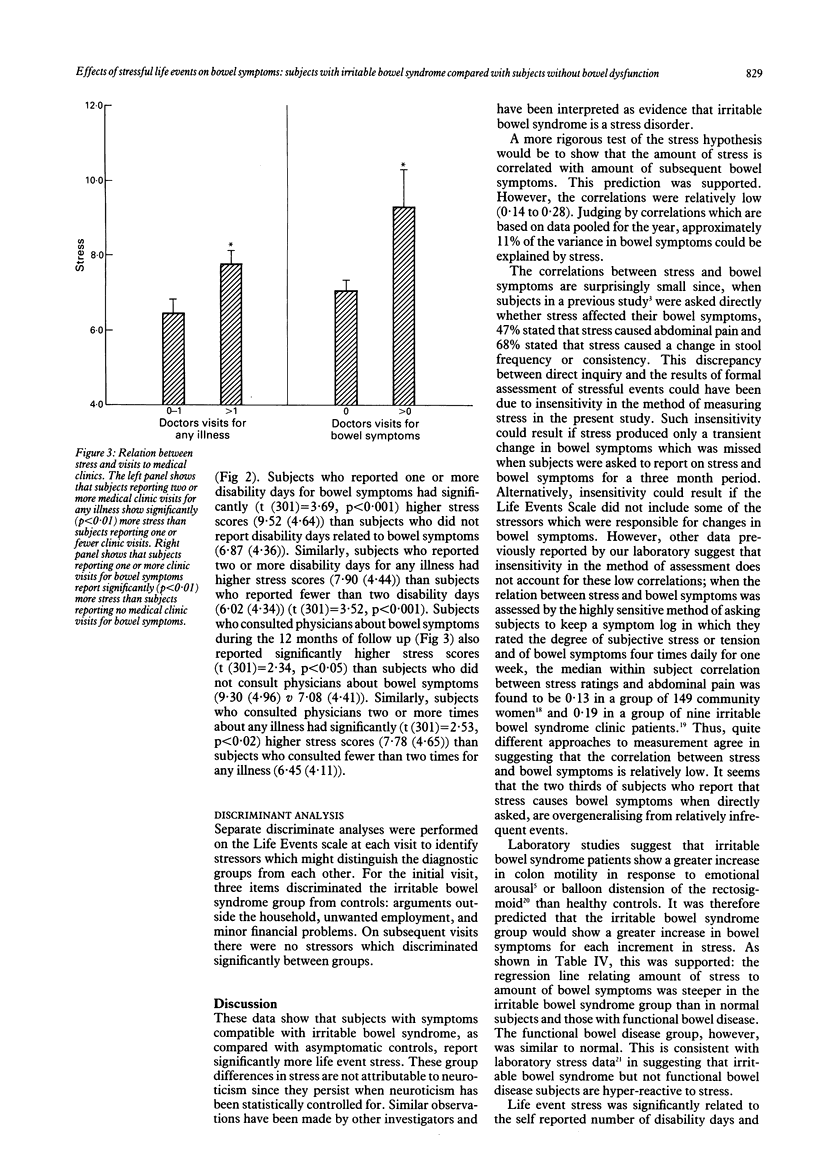
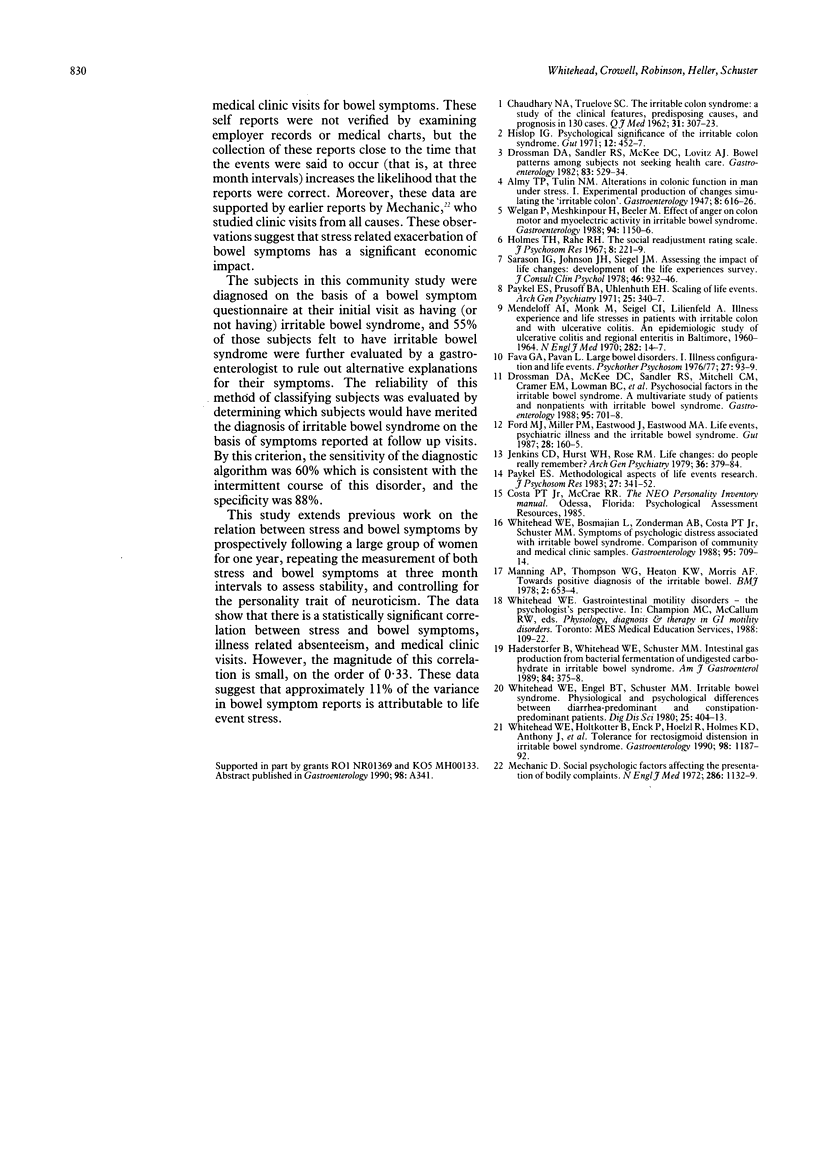
Selected References
These references are in PubMed. This may not be the complete list of references from this article.
- CHAUDHARY N. A., TRUELOVE S. C. The irritable colon syndrome. A study of the clinical features, predisposing causes, and prognosis in 130 cases. Q J Med. 1962 Jul;31:307–322. [PubMed] [Google Scholar]
- Drossman D. A., McKee D. C., Sandler R. S., Mitchell C. M., Cramer E. M., Lowman B. C., Burger A. L. Psychosocial factors in the irritable bowel syndrome. A multivariate study of patients and nonpatients with irritable bowel syndrome. Gastroenterology. 1988 Sep;95(3):701–708. doi: 10.1016/s0016-5085(88)80017-9. [DOI] [PubMed] [Google Scholar]
- Drossman D. A., Sandler R. S., McKee D. C., Lovitz A. J. Bowel patterns among subjects not seeking health care. Use of a questionnaire to identify a population with bowel dysfunction. Gastroenterology. 1982 Sep;83(3):529–534. [PubMed] [Google Scholar]
- Ford M. J., Miller P. M., Eastwood J., Eastwood M. A. Life events, psychiatric illness and the irritable bowel syndrome. Gut. 1987 Feb;28(2):160–165. doi: 10.1136/gut.28.2.160. [DOI] [PMC free article] [PubMed] [Google Scholar]
- Haderstorfer B., Psycholgin D., Whitehead W. E., Schuster M. M. Intestinal gas production from bacterial fermentation of undigested carbohydrate in irritable bowel syndrome. Am J Gastroenterol. 1989 Apr;84(4):375–378. [PubMed] [Google Scholar]
- Hislop I. G. Psychological significance of the irritable colon syndrome. Gut. 1971 Jun;12(6):452–457. doi: 10.1136/gut.12.6.452. [DOI] [PMC free article] [PubMed] [Google Scholar]
- Jenkins C. D., Hurst M. W., Rose R. M. Life changes. Do people really remember? Arch Gen Psychiatry. 1979 Apr;36(4):379–384. doi: 10.1001/archpsyc.1979.01780040021001. [DOI] [PubMed] [Google Scholar]
- Manning A. P., Thompson W. G., Heaton K. W., Morris A. F. Towards positive diagnosis of the irritable bowel. Br Med J. 1978 Sep 2;2(6138):653–654. doi: 10.1136/bmj.2.6138.653. [DOI] [PMC free article] [PubMed] [Google Scholar]
- Mechanic D. Social psychologic factors affecting the presentation of bodily complaints. N Engl J Med. 1972 May 25;286(21):1132–1139. doi: 10.1056/NEJM197205252862105. [DOI] [PubMed] [Google Scholar]
- Mendeloff A. I., Monk M., Siegel C. I., Lilienfeld A. Illness experience and life stresses in patients with irritable colon and with ulcerative colitis. An epidemiologic study of ulcerative colitis and regional enteritis in Baltimore, 1960-1964. N Engl J Med. 1970 Jan 1;282(1):14–17. doi: 10.1056/NEJM197001012820104. [DOI] [PubMed] [Google Scholar]
- Paykel E. S. Methodological aspects of life events research. J Psychosom Res. 1983;27(5):341–352. doi: 10.1016/0022-3999(83)90065-x. [DOI] [PubMed] [Google Scholar]
- Paykel E. S., Prusoff B. A., Uhlenhuth E. H. Scaling of life events. Arch Gen Psychiatry. 1971 Oct;25(4):340–347. doi: 10.1001/archpsyc.1971.01750160052010. [DOI] [PubMed] [Google Scholar]
- Sarason I. G., Johnson J. H., Siegel J. M. Assessing the impact of life changes: development of the Life Experiences Survey. J Consult Clin Psychol. 1978 Oct;46(5):932–946. doi: 10.1037//0022-006x.46.5.932. [DOI] [PubMed] [Google Scholar]
- Welgan P., Meshkinpour H., Beeler M. Effect of anger on colon motor and myoelectric activity in irritable bowel syndrome. Gastroenterology. 1988 May;94(5 Pt 1):1150–1156. doi: 10.1016/0016-5085(88)90006-6. [DOI] [PubMed] [Google Scholar]
- Whitehead W. E., Bosmajian L., Zonderman A. B., Costa P. T., Jr, Schuster M. M. Symptoms of psychologic distress associated with irritable bowel syndrome. Comparison of community and medical clinic samples. Gastroenterology. 1988 Sep;95(3):709–714. doi: 10.1016/s0016-5085(88)80018-0. [DOI] [PubMed] [Google Scholar]
- Whitehead W. E., Engel B. T., Schuster M. M. Irritable bowel syndrome: physiological and psychological differences between diarrhea-predominant and constipation-predominant patients. Dig Dis Sci. 1980 Jun;25(6):404–413. doi: 10.1007/BF01395503. [DOI] [PubMed] [Google Scholar]
- Whitehead W. E., Holtkotter B., Enck P., Hoelzl R., Holmes K. D., Anthony J., Shabsin H. S., Schuster M. M. Tolerance for rectosigmoid distention in irritable bowel syndrome. Gastroenterology. 1990 May;98(5 Pt 1):1187–1192. doi: 10.1016/0016-5085(90)90332-u. [DOI] [PubMed] [Google Scholar]


